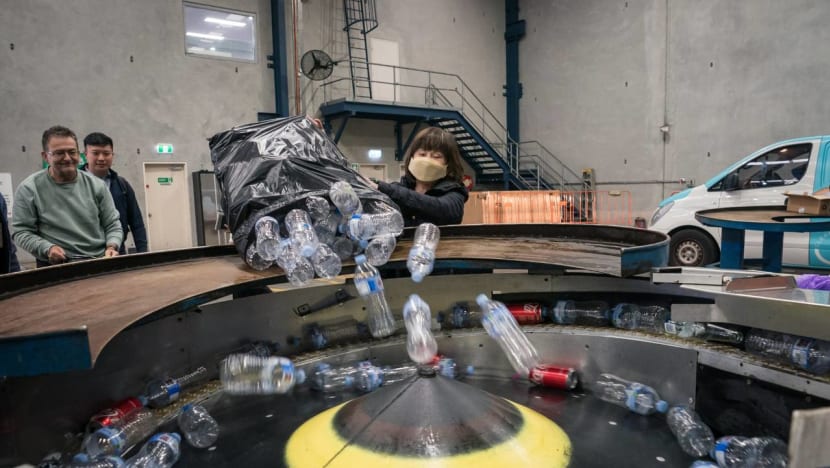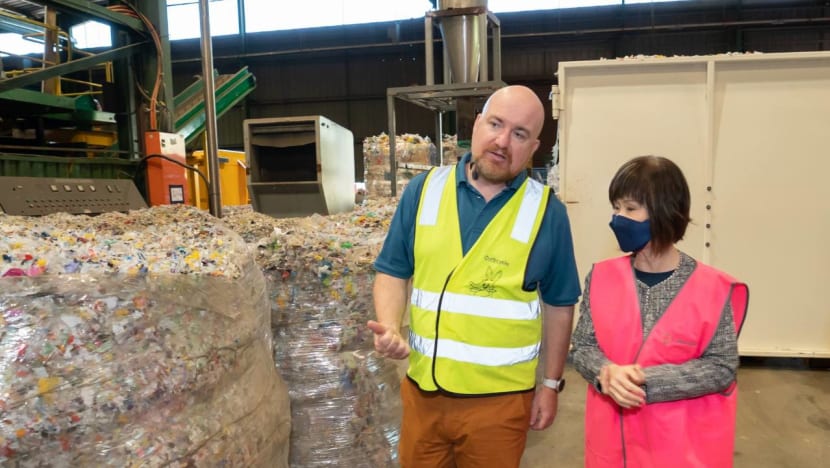Singapore to ‘relook’ timeline of beverage container return scheme following feedback: Amy Khor

Senior Minister of State for Sustainability and the Environment Amy Khor empties a bag of used beverage containers into a machine that will sort them for recycling at a facility in Sydney on Apr 27, 2022. (Photo: MSE)
SYDNEY: The Singapore Government will “relook” its timeline for the roll out of a beverage container return scheme following feedback from industry players, said Senior Minister of State for Sustainability and the Environment Amy Khor on Friday (Apr 29).
The scheme, which will encourage people to recycle drink containers such as plastic bottles and aluminium cans, was announced during last year’s Committee of Supply debate. It was supposed to be launched in 2023, and a legislative framework introduced this year.
But industry players said they need more time to prepare for the implementation of the scheme, Dr Khor told reporters.
This includes clearing existing stock that do not have barcodes. In countries that have implemented similar return schemes, barcodes are typically used to determine whether a product is recyclable.
“We appreciate the complexity of the scheme and we have been consulting and engaging the stakeholders extensively,” said Dr Khor.
“Taking into account the views and feedback of the stakeholders, we are also working with them on an appropriate timeline for implementation of the scheme.”
Dr Khor was speaking to reporters after wrapping up a five-day visit to Sydney, where she led a delegation of Singapore companies and academics on a business mission trip organised by the Waste Management and Recycling Association Singapore.
The 30-person delegation, which included representatives of waste management companies, visited several waste and recycling facilities in Australia’s New South Wales state to learn about their processes as well as solutions to challenges such as high contamination rates and getting public buy-in.

It comes as Singapore prepares to roll out a beverage container return scheme, paving the way for a national framework that will make companies responsible for the take-back, recycling and disposal of packaging.
The Extended Producer Responsibility (EPR) scheme for packaging aims to boost recycling rates for packaging waste, which currently makes up about a third of household waste in Singapore, and reduce the amount sent to the landfill.
It will be the second waste stream to have such a strategy being implemented. Last year, the EPR framework for e-waste came into effect, making producers, importers and retailers of electrical and electronic equipment accountable for the collection and proper treatment of e-waste.
According to the National Environment Agency’s latest waste report, just 6 per cent of Singapore’s plastic waste - which includes plastic packaging - was recycled last year, with the rest burned in waste-to-energy plants.
But the wheels are in motion to reduce Singapore’s mountain of packaging waste.
Companies are now required to report the amount of packaging they use. Under the Mandatory Packaging Reporting scheme, producers of packaged products whose gross annual revenue is above S$10 million are required to submit reports. This includes manufacturers, importers, brand owners as well as retailers such as supermarkets.
The reports include information on the type and amount of packaging companies use for their products in Singapore, and plans to reduce, reuse or recycle them.
The annual reports will lay the foundation for the EPR scheme which will be implemented no later than 2025.
Last month, the Government announced that large supermarkets will be required to charge a minimum of 5 cents for each disposable carrier bag from mid-2023.
“We fire on all cylinders, we take a whole-of-society approach (where there are multiple stakeholders), so it is not just about recycling,” said Dr Khor.
“It should actually be reduce and reuse first, and recycle needs to be done but that's whatever you have created as trash but we're turning it to treasure,” she added.
Editor’s note: An earlier version of this story said the scheme for companies to report the amount of packaging they use began on Monday. This is incorrect. We apologise for the error.
















